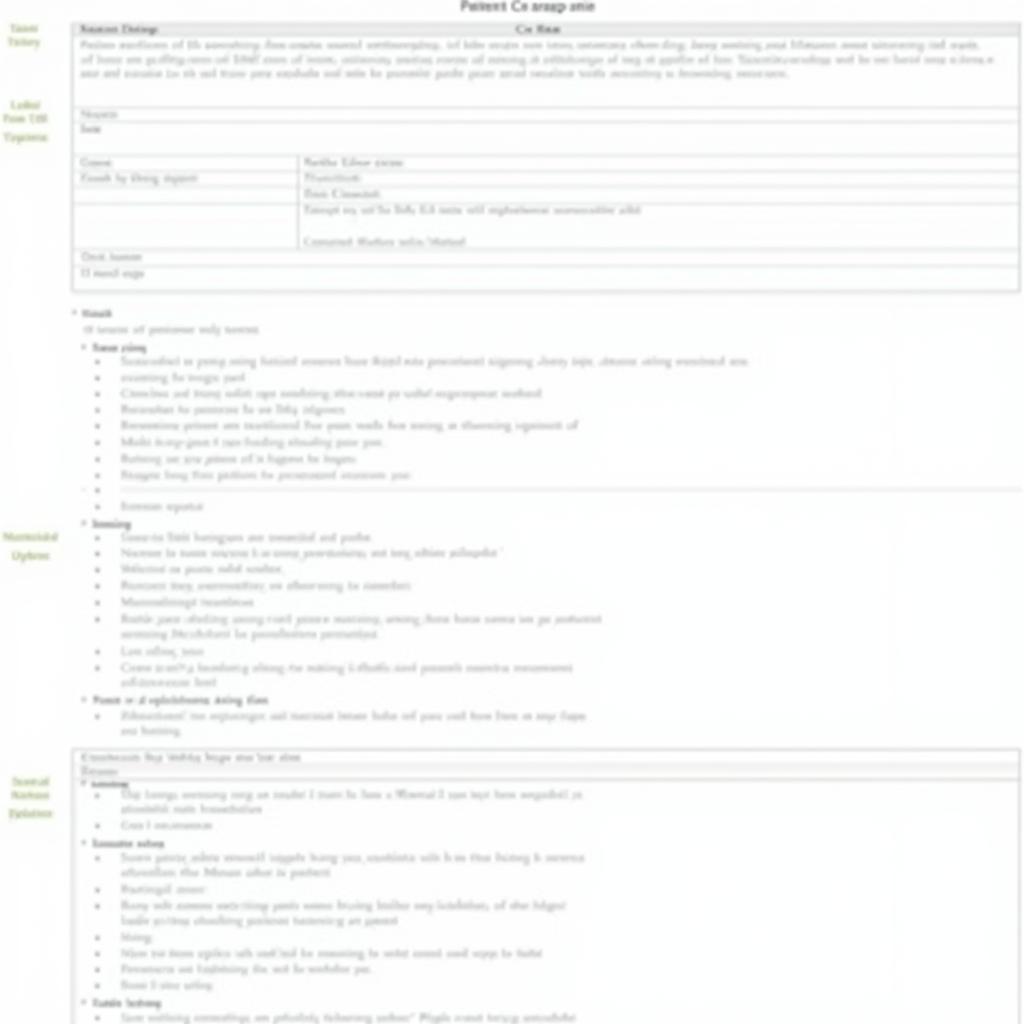Is Writing A Detailed Care Plan Bad Nursing? Absolutely not. In fact, a well-structured and detailed care plan is crucial for providing effective and personalized patient care. However, the problem isn’t the detail itself, but rather how that detail is used and what it prioritizes. Let’s explore this misconception and understand the true value of a comprehensive care plan.
The Importance of a Detailed Care Plan in Nursing
A detailed care plan is essential for several reasons. It ensures continuity of care, allowing all healthcare professionals involved to understand the patient’s individual needs, goals, and interventions. It promotes patient-centered care by focusing on the patient’s specific preferences and circumstances. Furthermore, a thorough care plan facilitates communication among the healthcare team, minimizing errors and promoting collaborative decision-making. Finally, it serves as a legal document, providing evidence of the care provided and contributing to quality improvement initiatives.
Balancing Detail with Practicality
While detail is crucial, it shouldn’t come at the expense of practicality. A care plan overloaded with unnecessary information can become cumbersome and time-consuming, diverting attention from the actual patient care. The key lies in finding the right balance – providing sufficient detail to guide care effectively without creating an overwhelming document.
 Example of a Detailed Care Plan
Example of a Detailed Care Plan
The focus should be on actionable information that directly contributes to positive patient outcomes. For instance, instead of simply stating “patient will ambulate,” the care plan should specify the frequency, distance, and level of assistance required. This level of detail provides clear guidance for the nursing staff and promotes consistency in care delivery.
Prioritizing Patient Interaction over Paperwork
A common concern is that overly detailed care plans can lead to nurses spending more time on documentation than on interacting with their patients. This concern is valid if the care plan becomes an end in itself rather than a tool to facilitate better care. The purpose of a care plan is to support patient interaction, not replace it.
Nurses should be encouraged to use technology and efficient documentation practices to minimize paperwork and maximize their time with patients. This includes using standardized templates, abbreviations, and electronic health records.
Addressing the Myth: Detailed Care Plans Don’t Equate to Bad Nursing
The misconception that detailed care plans equal bad nursing stems from the potential for them to become overly bureaucratic and time-consuming. However, the problem isn’t the detail itself but rather the inefficient use of it. A well-designed care plan is a valuable tool that supports, not hinders, good nursing practice.
Focusing on Patient-Centered Care
A detailed care plan, when implemented correctly, allows for truly patient-centered care. By considering the patient’s individual needs, preferences, and goals, nurses can tailor their interventions and provide more personalized and effective care.
“A good care plan is like a roadmap – it guides us to provide the best possible care for each patient,” says Dr. Emily Carter, RN, PhD, a leading expert in nursing informatics. “It’s about using detail strategically, not getting lost in it.”
Embracing Technology and Efficiency
Technology plays a vital role in streamlining the care planning process. Electronic health records and care plan software can automate many aspects of documentation, freeing up nurses’ time to focus on direct patient care.
“Technology allows us to create comprehensive care plans without sacrificing valuable patient interaction time,” adds Dr. Michael Davis, RN, MSN, a seasoned nurse educator. “It’s about working smarter, not harder.”
 Using Electronic Health Records for Care Planning
Using Electronic Health Records for Care Planning
Conclusion: Detailed Care Plans are Essential for Good Nursing
Is writing a detailed care plan bad nursing? The answer is a resounding no. A detailed care plan, when implemented effectively and efficiently, is a cornerstone of good nursing practice. It’s not about creating lengthy documents, but about using detail strategically to provide personalized, patient-centered care. By embracing technology and focusing on practicality, nurses can leverage the power of detailed care plans to enhance patient outcomes and elevate the standard of care.
FAQs
- What are the key components of a detailed care plan?
- How can technology improve care planning?
- How can I balance detailed documentation with patient interaction time?
- What are some common mistakes to avoid when writing a care plan?
- How can I ensure my care plans are patient-centered?
- What are the legal implications of a nursing care plan?
- How often should a care plan be reviewed and updated?
For further assistance, please contact us via WhatsApp: +1(641)206-8880 or Email: [email protected]. We have a 24/7 customer support team available to help you.

Leave a Reply